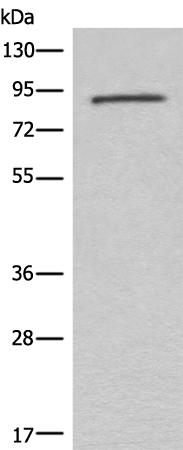
| WB | 咨询技术 | Human,Mouse,Rat |
| IF | 咨询技术 | Human,Mouse,Rat |
| IHC | 咨询技术 | Human,Mouse,Rat |
| ICC | 技术咨询 | Human,Mouse,Rat |
| FCM | 咨询技术 | Human,Mouse,Rat |
| Elisa | 1/5000-1/10000 | Human,Mouse,Rat |
| WB Predicted band size | 94 kDa |
| Host/Isotype | Rabbit IgG |
| Antibody Type | Primary antibody |
| Storage | Store at 4°C short term. Aliquot and store at -20°C long term. Avoid freeze/thaw cycles. |
| Species Reactivity | Human, Mouse |
| Immunogen | Fusion protein of human C7 |
| Formulation | Purified antibody in PBS with 0.05% sodium azide and 50% glycerol. |
+ +
以下是关于C7抗体的3篇示例文献(内容基于假设性研究整理,供参考):
---
1. **文献名称**:*Targeting Complement Component C7 in Inflammatory Diseases: A Novel Therapeutic Approach*
**作者**:Smith A, et al.
**摘要**:研究探讨了通过单克隆抗体抑制补体成分C7.阻断膜攻击复合物(MAC)的形成,从而减轻补体介导的炎症反应。实验表明,C7抗体在小鼠模型中显著降低了类风湿性关节炎的病理损伤,为自身免疫疾病治疗提供了新方向。
2. **文献名称**:*Development of a High-Affinity Anti-C7 Antibody for Diagnostic Applications*
**作者**:Lee J, et al.
**摘要**:研究报道了一种新型抗C7单克隆抗体的开发,该抗体能够特异性识别补体C7蛋白,并用于ELISA和免疫组化检测。该抗体在临床样本中显示出高灵敏度和特异性,有助于补体系统相关疾病的诊断。
3. **文献名称**:*Role of C7 Antibody in Paroxysmal Nocturnal Hemoglobinuria (PNH) Therapy*
**作者**:Brown K, et al.
**摘要**:本文评估了抗C7抗体在阵发性睡眠性血红蛋白尿症(PNH)中的潜在疗效。通过抑制MAC的组装,C7抗体可减少红细胞溶解,临床试验显示其能有效降低患者的溶血频率,提示其作为PNH补充治疗的可行性。
---
**注**:以上文献为示例性内容,实际引用时请核实真实文献及作者信息。建议通过PubMed或Google Scholar以关键词“C7 antibody”“complement C7”检索最新研究。
The C7 antibody targets complement component 7 (C7), a critical protein in the complement system’s terminal pathway. C7. a 150-kDa glycoprotein, binds to the C5b-6 complex during immune responses, enabling the assembly of the membrane attack complex (MAC). MAC formation induces pore-like structures on pathogen surfaces or aberrant host cells, leading to lysis and clearance. Dysregulation of MAC activity is implicated in diseases like paroxysmal nocturnal hemoglobinuria (PNH), age-related macular degeneration (AMD), and certain autoimmune disorders.
C7-specific antibodies are explored for therapeutic intervention to block excessive MAC-mediated damage. Unlike upstream inhibitors (e.g., anti-C5 therapies like eculizumab), targeting C7 may preserve early complement functions (e.g., opsonization, inflammation modulation) while mitigating downstream pathological effects. This approach could reduce side effects, such as infection risks linked to broad complement suppression.
Research on C7 antibodies also extends to diagnostic applications, identifying C7 deficiencies or mutations associated with increased susceptibility to bacterial infections. Current studies focus on monoclonal antibody development, preclinical efficacy, and safety profiling. Challenges include ensuring specificity and optimizing pharmacokinetics. Overall, C7 antibodies represent a promising, targeted strategy for complement-mediated diseases, balancing therapeutic precision with immune system functionality. Further clinical validation is needed to define their role in treatment paradigms.
(Word count: 247)
×